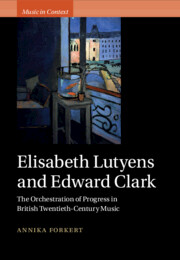Book contents
- Elisabeth Lutyens and Edward Clark
- Music in Context
- Elisabeth Lutyens and Edward Clark
- Copyright page
- Dedication
- Contents
- Figures
- Tables
- Musical Examples
- Preface
- Acknowledgements
- Introduction
- 1 Conducting Personae
- 2 Composing Influence
- 3 Crafting Music
- 4 Collaborating to Control
- 5 Completing the Lives
- Afterword
- Bibliography
- Main Archives
- Index
1 - Conducting Personae
Clark as a Conductor, 1910–1962
Published online by Cambridge University Press: 05 October 2023
- Elisabeth Lutyens and Edward Clark
- Music in Context
- Elisabeth Lutyens and Edward Clark
- Copyright page
- Dedication
- Contents
- Figures
- Tables
- Musical Examples
- Preface
- Acknowledgements
- Introduction
- 1 Conducting Personae
- 2 Composing Influence
- 3 Crafting Music
- 4 Collaborating to Control
- 5 Completing the Lives
- Afterword
- Bibliography
- Main Archives
- Index
Summary
Before he became an impresario, concert organiser, administrator, and occasional writer, Edward Clark trained as a conductor in Berlin. Conducting was not only his earliest career choice and his only expression of active music making, but it also remained at the heart of almost all his musical activities. Conducting enabled him to perform his role as the European gentleman to his friends, to the composers he admired, and on occasion even to the whole country. Through his conducting, Clark sought to influence the performance of music he hoped would shape the future. Occasionally, his conducting also helped to bring Elisabeth Lutyens’s music to life, or simply alleviated financial strain. But whether his conducting technique and the aesthetics he sought to promote through it were successful is a different question. Many of his contemporaries would have answered this question with a resounding ‘no’.
- Type
- Chapter
- Information
- Elisabeth Lutyens and Edward ClarkThe Orchestration of Progress in British Twentieth-Century Music, pp. 28 - 65Publisher: Cambridge University PressPrint publication year: 2023

